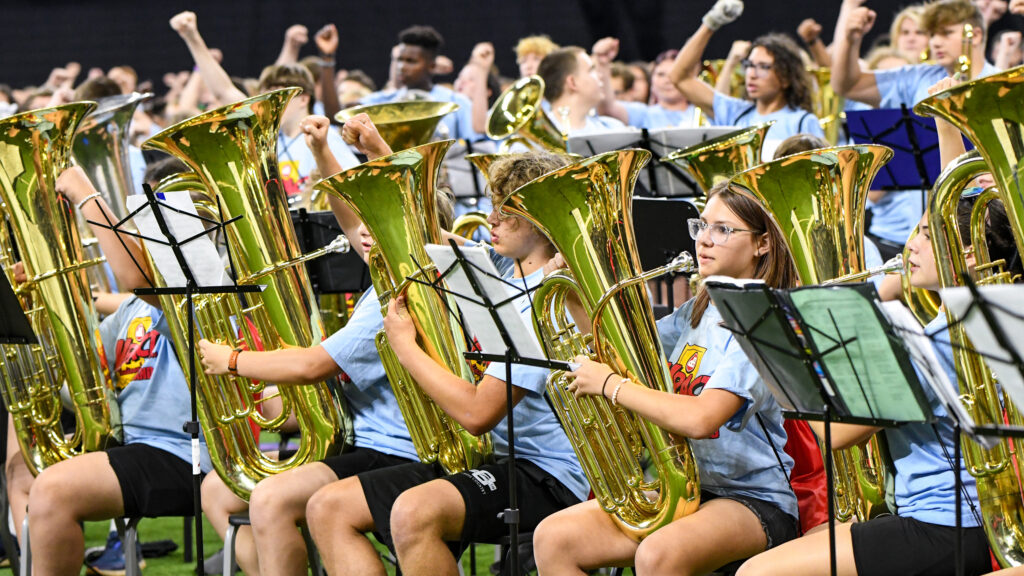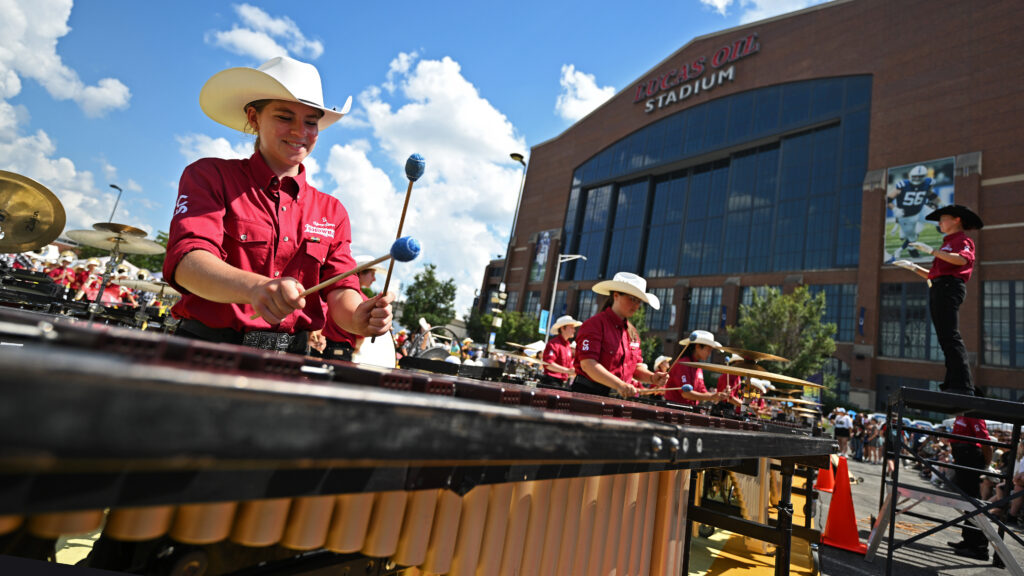In honor of Frederick Fennell’s 90th birthday today, here’s a Fanfare interview Mike Boo conducted with Fennell. It originally ran on DCI.org in the fall of 2002.
Drum Corps International was proud to host famed maestro Dr. Frederick Fennell at the 2001 World Championships. Fennell founded the wind ensemble movement at Eastman School of Music in Rochester, N.Y., and taught at the school from 1933 until 1962. His groundbreaking recordings for Mercury Records introduced wind ensemble literature to the world, and have recently been made available on CD. He was among the first conductors of any idiom to record for CDs.

He has 72 highly praised albums to his credit. Well into his 80s, he still writes extensively, works band camps throughout the summer and conducts about 70 bands around the world every year. Then past year alone has seen him conduct in such diverse places as Argentina, Switzerland, and Tokyo, where he was principal conductor of the Tokyo Kosei Wind Symphony from 1984 until 1999.
While at the DCI festivities, he shared his insights with a multitude of interested parties, and I was quite fortunate to spend the larger part of three days with him as his guide. The following is a transcript of an interview held after Fennell witnessed a few hours of corps rehearsals and the quarterfinals competition. He shares his feelings about drum corps and the spirit of competition, and finishes with an admonition to band directors.
Read part 2 of Boo’s discussion with Fennell.
Boo From what you’ve seen, what do you think of drum and bugle corps?
Fennell: There are so many things to be expressed. I think, first of all, the end result of all the planning, all of the developing, and all of the basic teaching that goes into putting together a group of this kind, is a moving musical experience. You can interpret movement as a function of the body and what it means to the inspirational part of life. To see any drum and bugle corps that has come as far as DCI World Championships is to see the result of all that careful planning and all the investment of time and funds, resulting in a very large number of people who have to learn what their part is in the entire operation.
That means that you can’t think about coming without first of all; discipline, imagination, consistency, and the ability to adjust as circumstances make necessary. But in order to do all of this, everybody has to be a listener. If they don’t come into this as a good listener, they’ll soon learn that’s what they’ll have to do to stay. You can be across the football field, several yards apart, and you have to know what’s going on at both ends of the field. The other remarkable thing is that people do this because they want to.
Nobody can oblige anybody to do this. It is really amazing to a person who mostly deals with sit-down professional groups; even the most professional sit-down groups don’t always respond to a request. They think they have to filter it through their system before they can do this or that. In the corps, you find immediate response to a very clear direction, very informative direction that is brief and to the point and usually doesn’t miss anybody. And this, of course, is very remarkable. To see a whole row of brass instruments all move at once, the same way, involves the disciple of the body.
I don’t see how having your body in good discipline can be a bad idea. I don’t see how learning how to begin pieces and conclude pieces as they do, in the spirit that they do, can be considered anything buy a worthy achievement. I think there is great merit in competition. Life is very competitive. This work is very competitive. I think that this makes drum corps unique and extraordinary. That someone in rehearsal responds to a suggestion to redo something, reset something that they are practicing, and everybody knows exactly right where to go, means that someone has been thinking about how to do this, They all have big responsibilities.
I had a chance to see one of the top corps [Santa Clara Vanguard] go through their show the other night, before the competition began, and this to me was absolutely incredible. I know they had been playing it quite a few times in a few places, but all of this pointed towards what’s going to happen here in Buffalo, N.Y., in this hall. And this is a hall. Yes, it’s a bowl. I realize that. But it is a field of play that is a little bit different than what it was designed for … it is also functioning as a hall. The field of play is unique and extraordinary. To me, all of this adds up to the total experience of a person that will likely be with them in the years after they age out.
If they become teachers, they’re going to take with them many of the things they will learn from the teachers they have worked with in the field of drum corps, because they have found out here that those ideas work. Not everyone who graduates from institutes of higher education seems to understand that. This is a field of higher education. This a field in which everybody must know the music forwards and backwards, They can’t just have a casual acquaintance with it, but must know it inside-out, know it so that they can start from almost any place that the person observing and teaching requests of them.
They always know where they are in the music. It’s a very intelligent use of numbers. Their response to all these requests, is to me, absolutely colossal. I was impressed with the corps’ use of numbers to describe the dynamic of a sound and the position of the group for a certain formation. When the instructor asked the bass drums, “What’s your dynamic?” the drummers said, “It’s an mf,” and they gave it a number. The instructor said, “Make it an mp,” and he gave them another number. And it was done. But first he asked them, and they knew. They better know so they can respond. This idea of using numbers for correlating dynamic levels is a terrific idea. The average sit-down band doesn’t run the gamut of dynamics from ppp to fff.
They don’t do so naturally. In some situations, that happens because the teacher is just happy they push down the right button and make the right sounds before they even begin to worry about what the dynamics should be. But you have to worry about that from the very beginning. That’s obviously what they do here. I think I’m going to try that myself, because if you put a number on the dynamic, it’s going to be so different from what they’ve heard before, it might just catch their attention. It’s the range of sound from one to whatever.
You’re not going to hear the top number very often, but you’ve got to hear everything in between. I heard references at that rehearsal from the head instructor in the stands, to balance the need for more mellophones, who, like sit-down French horns, are customarily very much involved in the critical harmonic structure of whatever is being played. If you don’t have what’s in the middle, something is missing. When the corps open up the sound and gives you a big chord, it’s as balanced as anything that can be, from top to bottom. There again, it’s a response to the striving for continual balance.
I am aware of the reaction of many men and women in the field of music education that are involved with teaching orchestra or band. They are suspicious of what drum corps is. I think frequently they are insecure, not basing their opinion on knowledge of what happens in one of these groups. I think they should take advantage of the opportunity to talk to half a dozen young people who have been in drum corps; talk to them, find out what they’ve learned here.
All the things the members are learning here is so usable. I think the flat out “no” from some music educators is shallow and unacceptable. It certainly is not the Guarneri String Quartet, nor is it the Canadian Brass, but it is what it is. And that is a proven fact. As for so many things in life, I would encourage them to accept it for what it is.
Boo: What about the spirit of competition?
Fennell: Much of life is undoubtedly a competitive experience, whether it involves practicing on a football field, a basketball court, a running track, a driving track, or is within rock groups or symphony orchestras in the sale of their concerts and recordings. Competition is everywhere. And this is one of the places where it is very positively stands for what it does.
The variety of adjudicators makes the end result a cyclopean view of what has been happening on the field, and they of course have to be responsible for their judgment. Life is competitive, like from the day you’re born.
Boo: What about the thrill of hearing a corps on the field?
Fennell: The presentation of what has finally been worked out over several rehearsals commands your attention. Not only the playing of the brass, but also the physically handling of the instruments from the position of rest and the position of play. The flags are used both as flags and as objects that can be thrown into the air and grabbed out of the air, in coordination with the music, emphasizing the music. The sound of the group usually, let’s say playing a “six” at the conclusion of their presentation, is obviously planned to attract the attention of the audience, unless they choose to end the presentation extremely quiet.
I don’t imagine very many drum corps do end quietly, but everything depends on the theme or what the motif is. If they choose a motif, is it to their advantage to choose an idea like the work ethic as Santa Clara did [in “New Era Metropolis”]? You could of course play something like the evolution and contribution of Spanish music, to pick one thing, or the difference between 19th and 20th Century Russian music. This idea of having a show representing a workday is very well carried out. And the program will make that clear, like the simple-but-effective idea of having all of them looking at their watch.
I just want to be sure I mention the fact that when the members age out, and maybe they are still in the final years of their college education, they will discover that much of what they have experienced in drum and bugle corps can be used in their final years of school. It can also be used in the earliest years of their job, what they have been to school to prepare themselves for. The drum corps is going to contribute to their future in many handsome ways.
It would be very difficult for so many groups to understand and work at the work ethic tempo of a drum and bugle corps, because most kids in schools are not in corps. But, they should somehow be able to make the work ethic contribute to their work. It is a work ethic that is seen at practices. The kids are totally dedicated to get into place when their instructors tell them, and everyone immediately goes to where they should be. You don’t have to stop and worry about it, they know what they’re doing. This work ethic would be such a desirable aspect of teaching school groups of any instrumentation, instrumental or vocal.
I spent enough years as a music director with a very powerful group in Japan [the Kosei Wind Ensemble] to know that the Japanese understand what we are seeing here is the work ethic. And among other reasons, this is one of those reasons why the Japanese concert groups that tour the United States always produce such spectacular results. To music educators: Don’t make decisions about drum corps without really investigating it.





